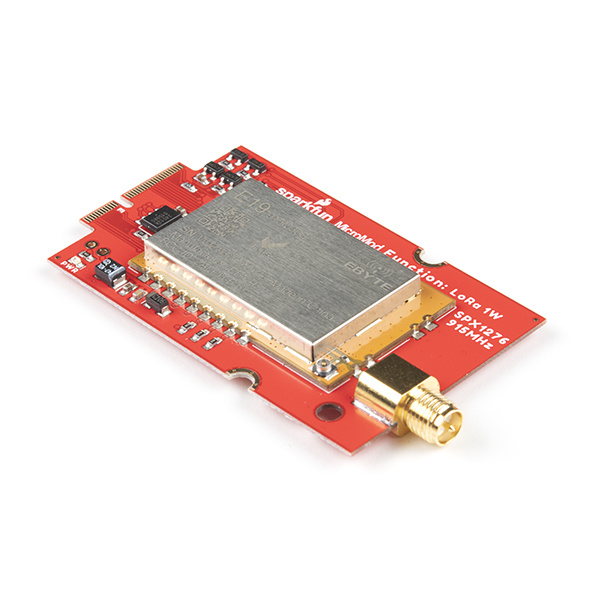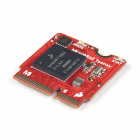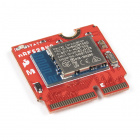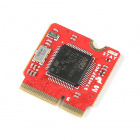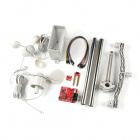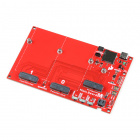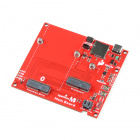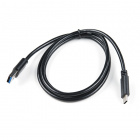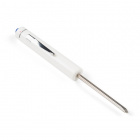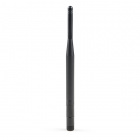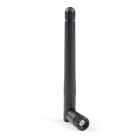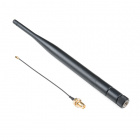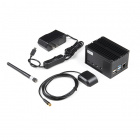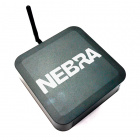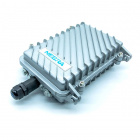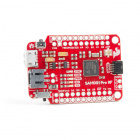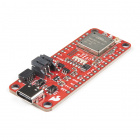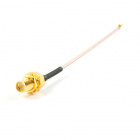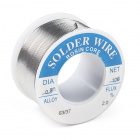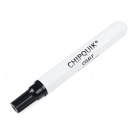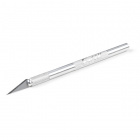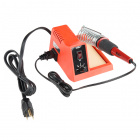Contributors:
 Nate
Nate,
santaimpersonator Introduction
The 1W LoRa MicroMod Function Board adds LoRa capabilities to your MicroMod project. It is intended to be used in conjunction with a MicroMod processor board and a MicroMod main board, which provides the electrical interface between a processor board and the function board(s).
WRL-18573
The SparkFun MicroMod LoRa Function Board provides LoRA and LoRaWAN capabilities to your MicroMod project.
Retired
Match up the board's M.2 edge connector to the slot of the M.2 connector and secure the function board with the screws provided with the main board.
Utilizing the 915M30S LoRa module from EBYTE, which is a 1W (30dBm) transceiver based around the SX1276 from Semtech. There is a robust edge mount RP-SMA connector for large LoRa (915MHz) antennas; with modification, a U.FL connector is also available. We've successfully tested a 12 miles line-of-sight transmission with this module (user results may vary).
With the MicroMod standardization, users no longer need to cross-reference schematics with datasheets, while fumbling around with jumper wires. Simply, match up the function board's M.2 edge connector to the slot of the M.2 connector on the main board and secure the function board with screws. All connections are hardwired to compatible pins of the processor board and the pin connections are standardized for the processor boards.
Required Materials
To get started, users will need a few of the items listed below. (You may already have a some of these items; read through the guide and modify your cart accordingly.)
MicroMod Processor Board
A processor board is required for the MicroMod system to operate. Users can choose a processor board, based upon their needs, to attach to the MicroMod M.2 connector of the main board. Below, are few options:
DEV-16402
This board leverages the awesome computing power of the NXP iMXRT1062 chip (ARM Cortex-M7) and pairs it with the M.2 MicroMod…
WRL-16984
The SparkFun MicroMod nRF52840 Processor offers a powerful combination of ARM Cortex-M4 CPU and 2.4 GHz Bluetooth transceiver…
DEV-21326
The SparkFun MicroMod STM32 Processor Board is ready to rock your MicroMod world with its ARM® Cortex®-M4 32-bit RISC core!
KIT-22636
Whether you're an agriculturalist, a professional meteorologist, or a weather hobbyist, building a weather station can be a r…
MicroMod Main Board
A main board provides the electrical connections between the function and processor boards to operate. Users can choose a main board based upon their needs. Below, are few options:
DEV-20595
The MicroMod Main Board is a specialized carrier board that allows you to interface a MicroMod Processor Board with up to two…
DEV-20748
The MicroMod Main Board is a specialized carrier board that allows you to interface a MicroMod Processor Board with a single …
Required Hardware
A Phillips screw driver is necessary to attach the processor board and function board(s) to the main board. Additionally, a USB-C cable is needed to connect the main board to a computer. The LoRa function board also requires a LoRa antenna for the transceiver to operate.
CAB-14743
USB C is fantastic. But until we have converted all our hubs, chargers, and ports over to USB C this is the cable you're goin…
TOL-09146
This is just your basic reversible screwdriver - pocket sized! Both flat and phillips heads available. Comes with pin clip an…
Below, is a selection of our 915MHz frequency band RP-SMA antennas.
WRL-14876
Increase your range with this 1/2 wave duck antenna. Designed for 860 to 960MHz it is ideal for distant LoRa nodes. Utilizes …
WRL-14875
A small 1/4 wave rubber duck antenna for LoRa or other 860-960MHz communication. Antenna has a center frequency of 915MHz and…
WRL-14676
This universal Antenna Kit can also be used with LoPy, SiPy, LoPy4, and FiPy IoT development boards to talk over LoRa and Sig…
Retired
Optional Hardware
A LoRa gateway provides internet connection for LoRaWAN network. Below are a few options from our LoRa product category.
WRL-16447
This LoRa Gateway has 8 channels, 15km line of sight range, & comes assembled with everything necessary for easy deployment i…
Retired
WRL-17843
Join The People's Network and help provide hundreds of square miles of wireless network coverage on Helium LongFi™ (LoRaWAN…
Retired
WRL-17844
Join The People's Network and help provide hundreds of square miles of wireless network coverage on Helium LongFi™ (LoRaWAN…
Retired
Users can also use other LoRa boards for peer-to-peer communication. Below are a few options from our LoRa product category.
WRL-15836
The SparkFun Pro RF is a LoRa®-enabled wireless board that marries a SAMD21 and a long-range RFM95W to make a compact and ea…
WRL-17506
The SparkFun expLoRaBLE Thing Plus is a Feather form-factor development board with the NM180100 system in package (SiP), from…
WRL-14875
A small 1/4 wave rubber duck antenna for LoRa or other 860-960MHz communication. Antenna has a center frequency of 915MHz and…
WRL-00662
Commonly used to attach WiFi, Bluetooth, or nRFxxx based devices to a 2.4GHz antenna.
To modify the jumpers, users will need soldering equipment and/or a knife.
TOL-09325
This is your basic spool of lead free solder with a water soluble resin core. 0.031" gauge and 100 grams. This is a good spoo…
TOL-14579
This 10mL no-clean flux pen from Chip Quik is great for all of your solder, de-solder, rework, and reflow purposes!
TOL-09200
It's like an Xacto knife, only better. We use these extensively when working with PCBs. These small knives work well for cutt…
TOL-14228
The WLC100 from Weller is a versatile 5 watt to 40 watt soldering station that is perfect for hobbyists, DIYers and students.…
Retired
Suggested Reading
The MicroMod ecosystem is a unique way to allow users to customize their project to their needs. Click on the banner below for more information.
For users who aren't familiar with the following concepts, we also recommend reading the following tutorials before continuing.
Serial Communication
Asynchronous serial communication concepts: packets, signal levels, baud rates, UARTs and more!
Logic Levels
Learn the difference between 3.3V and 5V devices and logic levels.
I2C
An introduction to I2C, one of the main embedded communications protocols in use today.
Analog vs. Digital
This tutorial covers the concept of analog and digital signals, as they relate to electronics.
Processor Interrupts with Arduino
What is an interrupt? In a nutshell, there is a method by which a processor can execute its normal program while continuously monitoring for some kind of event, or interrupt. There are two types of interrupts: hardware and software interrupts. For the purposes of this tutorial, we will focus on hardware interrupts.
SparkFun expLoRaBLE Hookup Guide
Check out our latest LoRaWAN development board with Bluetooth capabilities! With this guide, we'll get you passing data to The Things Network in no time.
Getting Started with MicroMod
Dive into the world of MicroMod - a compact interface to connect a microcontroller to various peripherals via the M.2 Connector!
Designing with MicroMod
This tutorial will walk you through the specs of the MicroMod processor and carrier board as well as the basics of incorporating the MicroMod form factor into your own PCB designs!
MicroMod Main Board Hookup Guide
The MicroMod Main Board - Single and Double are specialized carrier boards that allow you to interface a Processor Board with a Function Board(s). The modular system allows you to add an additional feature(s) to a Processor Board with the help of a Function Board(s). In this tutorial, we will focus on the basic functionality of the Main Board - Single and Main Board - Double.
Installing an Arduino Library
How do I install a custom Arduino library? It's easy! This tutorial will go over how to install an Arduino library using the Arduino Library Manager. For libraries not linked with the Arduino IDE, we will also go over manually installing an Arduino library.
Installing Arduino IDE
A step-by-step guide to installing and testing the Arduino software on Windows, Mac, and Linux.
Installing Board Definitions in the Arduino IDE
How do I install a custom Arduino board/core? It's easy! This tutorial will go over how to install an Arduino board definition using the Arduino Board Manager. We will also go over manually installing third-party cores, such as the board definitions required for many of the SparkFun development boards.
